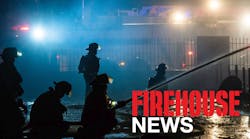But there's another factor that is often overlooked and more difficult to measure. It's the "human factor" and can be simply stated by asking this question: how well does a fire department take care of its own people?
Most fire departments score high on every standard, including the human factor. They have strong leadership that constantly demonstrates a concern for the welfare of their firefighters. This produces high morale and a strong sense of loyalty and pride. It's called "esprit" and it's always been an intangible but essential ingredient in the fire-rescue service.
Unfortunately, there are places where the human factor is being ignored in this era of liability, lawsuits and penny-pinching city governments. With increasing frequency, I'm hearing about fire departments that fail to take care of their most important resource the firefighters who risk their lives to do an inherently dangerous job.
One area where this lack of caring manifests itself is in the treatment of personnel who suffer disabling line-of-duty injuries. In recent months, I've heard from several firefighters who tell horror stories of how they were kicked around by a city government in the handling of disability claims and how their own fire department did little or nothing to help them. Instead of making sure they received all the benefits they were entitled to, the power of the government bureaucracy worked against them. Some cities have hired private insurance adjusters to resolve worker's compensation claims and when that happens it seems their primary objective is to pay the minimum amount possible or have the claim thrown out. Their success is measured by how much money they can save the city.
It's understood that there has to be a reasonable investigation to avoid fraud and protect the integrity of the system so there will be money available to pay the claims that are justified. But some of the stories I've heard are infuriating. For example, a firefighter who suffered a heart attack while fighting a fire had to file lawsuits for his worker's compensation and died before it could be settled. Now the city is trying to beat his family out of a legitimate line-of-duty claim. In another case, a firefighter injured while responding to an alarm has been denied disability benefits despite evidence that it clearly was a line-of-duty injury and there was no negligence on his part.
What's puzzling in some of these cases is the lack of support from a fire department's leadership. I can accept the fact that an outside insurance adjuster or city official may not care about an injured firefighter but I can't understand that attitude on the part of senior fire officers. The fire service tradition is to rally around those who've been injured and to help the families of those who lost their lives. One of the basic principles of leadership is that superior officers look out for those who serve under them. Morale collapses if the rank-and-file have no confidence in their leadership and, when that happens, you lose something that's essential in firefighting.
In the course of my work as a political reporter, I've met public officials who have no knowledge of the fire department and no appreciation of the special commitment it takes to be a firefighter. An example was the mayor of a northeastern city who told me that he was trying to find ways to make firefighters "more productive" at night when "they're being paid to sleep in the firehouse." I asked the mayor whether he had ever gone out at 3 A.M. on a sub-zero night to watch his "unproductive" employees fight a major fire. There was no response.
More recently, I met a mayor who was astounded when I mentioned that his city's fire department had a reputation as one of the best in the country. He talked at length about every other aspect of city government and the innovative things that were being done but he didn't have a clue when it came to the fire department. It was incredible that this man had no concept of how good a job his firefighters were doing and how much respect the fire service had for his chief.
I hope it's not widespread but I suspect there are other mayors, city managers and public officials who are just as indifferent. That's why it's important that anything dealing with the welfare of firefighters should be in the hands of experienced fire officers who are genuinely concerned about the troops in the trenches. Along with protecting the lives and property of its citizens, a fire department must also be committed to taking care of its firefighters.
Hal Bruno, a Firehouse® contributing editor, is ABC News political director and served many years as a volunteer firefighter.




